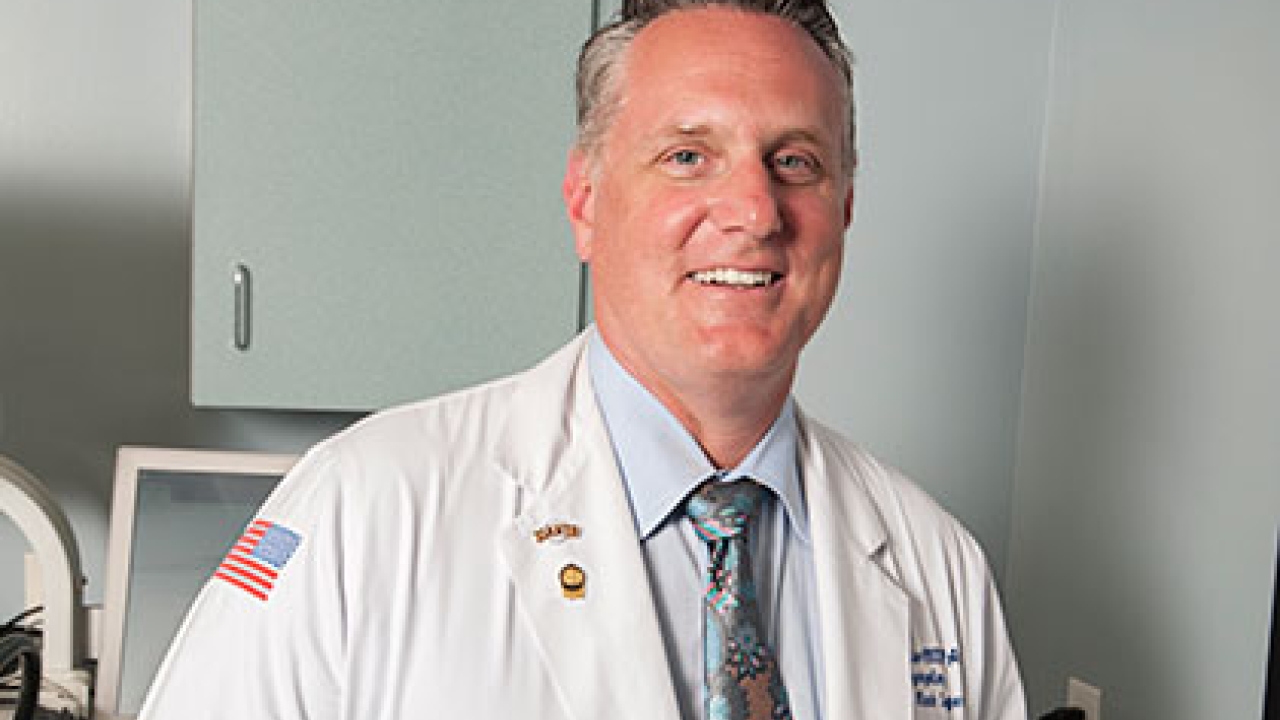
Redefined: From Jersey to Lab Coat
Restoring a parent’s ability to hear their child’s laughter, reviving a cooks olfactory senses, repairing a musician’s ability to sing—these are the types of moments Scott Fuller ’94 M.D. can give to his patients.
Fuller is an ear, nose and throat surgeon for UC Davis Health System and Veteran’s Administration of Northern California. Every time he goes into surgery, he knows he holds three of his patients’ five senses, and therefore a large part of how they experience the world, in his hands.
“A gentleman out of the Veteran’s Affairs hospital who came to me had a very advanced thyroid cancer that was invading his windpipe—and he was a singer,” said Fuller, who works four days per week at the Mather VA hospital in Sacramento and one day per week at UC Davis Health System. “So we had to have a conversation about possibly taking his voice box and possibly taking one of the nerves to his vocal cords. He would not be able to sing professionally again. It was really unnerving to the guy, and rightfully so; this was how he defined himself.”
These cases can be the hardest ones to battle, said Fuller, because in addition to wanting to save lives, he wants his patients to have an improved quality of life.
“In this case, it turned out I was able to remove all of the cancer without taking his voice box and while leaving his airway intact,” Fuller gleamed. “He’s singing now, is as happy as can be and cancer-free, and I count this case among my greatest success stories as a surgeon.”
Finding his way to the OR
Fuller has personal experience with how difficult it can be to reshape one’s identity. A football star at UC Davis, he was forced upon graduation to find a path off the field.
“When you define yourself as a football player and then it becomes apparent that you’re not going to be seriously considered for a professional career in football, it is very painful,” Fuller said. “I saw a lot of my friends linger and work odd-jobs so they could work out and try out for teams; but that just seemed like a waste of time to me, so I started looking for something else.”
Fuller’s father-in-law Paul Donald, M.D.,— also an ear, nose and throat surgeon at UC Davis and now professor emeritus — invited Fuller to shadow him at the hospital for a day to see if he had an interest in medicine. Fuller had majored in physical education and had a knack for physiology and anatomy but had never given a career in medicine much thought.
“I visited him at work and observed a laryngectomy, where the voice box is removed, and I was fascinated by it,” Fuller recounts. “And then I went with him to see patients in the clinic. The patients are really why anyone practices medicine; meeting them was very inspiring. So I chose to pursue a career in medicine, and I have never had one day of regret since.”
Fuller received a graduate degree in microbiology from the University of Tennessee, where he subsequently attended medical school before returning to UC Davis for his residency program in 2004. He has worked at UC Davis ever since—as a surgeon in ear, nose and throat oncology; a sleep apnea surgeon and specialist; and now as an assistant professor, teaching a head and neck examination course to second-year medical students.
“I’m proud every day to be an Aggie,” said Fuller. “The community here is phenomenal, with lots of really, really accomplished physicians. The comradery inspires a great stimulation of ideas. The treatment options and modalities for therapy and level of aggressiveness also seem to be endless—I have access to just about everything to take care of my patients.”
In service to those who served
Fuller’s involvement with the VA began during his head and neck oncologic, skull base, and microvascular reconstructive surgery fellowship at UC Davis in 2009. UC Davis’ close partnership with the VA allows medical residents and fellows to gain experiences with a wider range of patients.
“Right away, I noticed the patients at the VA were super appreciative of everything I did, even the slightest things,” he said. “They were phenomenal to work with.”
During his fellowship, Fuller discovered there was a need for his specialty within the VA and so decided to stay on after the fellowship ended. While he does not have a military background, his father’s time in the military helped motivate his work with veterans.
“Although I didn’t serve, I consider my work at the VA to be my service now,” he said. “And I love to do it.”
